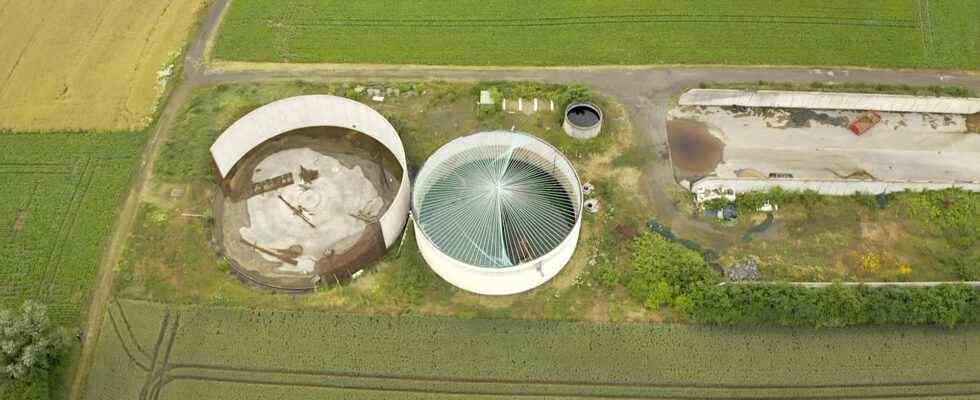Status: 07/13/2021 2:40 p.m.
Small investors invested over UDI millions in biogas and solar projects. When the financial supervisory authority ordered the repayment of the money for parts of the confusing company network, several companies filed for bankruptcy.
It is a major setback for Herbert Petzoldt. The pensioner from Oberursel near Frankfurt am Main had previously lost money in the scandal surrounding the insolvent wind farm operator Prokon. Now he has to fear again. Years ago he invested in financial products from UDI. The brochures were professionally presented. “That looked very serious at the beginning,” he says. But now he is still waiting for the repayment of around 65,000 euros.
Finanzvertrieb UDI: Many investors lose money
MEX, July 13th, 2021
UDI is a financial sales company that specializes in renewable energies. It was founded in 1998 in Roth near Nuremberg. The company started building biogas plants and solar parks in Germany, Italy and Spain in 2005. Small investors could participate in so-called subordinated loans. They were almost always called “fixed interest”. Those who invest receive their capital back after several years, including annual interest between four percent and 6.5 percent. UDI’s promise: “Green money. Clean returns.”
Financial supervision orders liquidations
But the group of companies has been in a crisis for years, which is dramatically worsening this year. In May and June, the financial supervisory authority BaFin ordered the “suspension and processing of the deposit business” for several fixed-interest companies due to ineffective contractual clauses. The investor monies would have to be repaid “immediately and in full”. But UDI cannot do that, which is why the company has filed for bankruptcy for almost a dozen companies.
The auditor Kai-Wilfrid Schröder noticed the economic problems, especially with the biogas plants, early on. “We have seen the UDI in great danger across the entire group since 2015. In 2017 the alarm bells could no longer be ignored.” The balance sheets of several biogas companies have shown liabilities in the millions for years. Some projects were never completed or implemented, such as the biogas plants in Kaichen and Steinau in Hesse. Sometimes there were construction defects and high repair costs. In 2018, the company in Otzberg, southern Hesse, had to file for bankruptcy.
Criticism of the corporate network
The corporate structure of UDI means that investors cannot immediately see how the company is doing. “The investor does not learn a single word about the economic situation of the entire group”, criticizes Schröder. He therefore calls on the legislature that such financial companies must prepare consolidated financial statements in the future – so that potential investors can quickly get an overview. Why did UDI never do that? On request, the company refers, among other things, to the current legal situation that does not provide for consolidated financial statements.
The lawyers who represent affected investors across Germany are currently in the process of getting an overview. “How the whole group is nested, where the money was invested and how, whether the money is still available, these are things that we will be dealing with in the next few months,” says Peter Mattil from the Munich law firm of the same name, for example. For the experienced capital law expert, the UDI case is similar to the Prokon case. The wind power company went bankrupt in 2014. In both cases, projects were cross-subsidized, says attorney Mattil. “And of course that can break the neck of an entire company.”
Difficult to understand cross-subsidization
Research of the Hessian broadcasting company show that UDI has repeatedly used investor funds to support loss-making projects. At the beginning, investors were not told exactly what their money was going to be used for. Example: the biogas plant in Barleben in Saxony-Anhalt. According to internal documents, more than 1.5 million euros in investor money flowed into the company by mid-2018. And that, even though the plant wrote deep red numbers, in 2017 alone the annual deficit was just under 1.9 million euros. The deficit biogas plant in Kreiensen in Lower Saxony was also supported in this way.
The Nuremberg public prosecutor has been investigating several UDI group leaders since last year. It is about suspicion of infidelity and fraud. The authority does not reveal whether only former managing directors and shareholders are in the focus of the investigation. UDI has changed hands twice in the past few years. Since October 2020, Rainer J. Langnickel and his holding company Dalasy have been trying to turn things around at UDI. On the allegation of infidelity, his company writes: “A final judgment on every point of criticism is not yet possible due to the complex issues and numerous societies.” The aim of the new owner is to “work up issues from the past internally”.
Haircut to support restructuring
The new management is now on a renovation course that is internally called “Matterhorn”. This includes a radical haircut. Small investors should forego at least 80 percent of their invested money. The remaining amount should then be paid out to them in installments over five years. Herbert Petzoldt will not accept the offer: “No, I will not go into it and then wait for bankruptcy if it should actually come. And then the leftovers will just be used.” According to the UDI, around 6,000 investors are currently waiting for their money, a total of 128 million euros.

